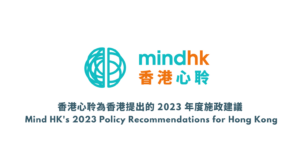Mind Mental Health Hong Kong Limited (Mind HK)
2023 Policy Recommendations for Mr John Lee, Chief Executive of Hong Kong
Mind HK, a local S88 registered charity, is submitting to the Chief Executive’s Policy Address Consultation to propose strategies for improving mental health support. Our suggestions draw upon our recent experience with the successful “Youth Wellbeing Practitioner Pilot Training Programme” and the urgent mental health needs observed in Hong Kong.
Recommendations:
-
Strengthen Early Detection and Support
Hong Kong is witnessing a steady rise in the prevalence of mental health conditions, making it crucial to focus on early detection and intervention for those at risk. We welcome the Advisory Committee on Mental Health’s proposed measures to enhance early identification and intervention strategies, inclusive of the provision of timely assessment and early referral.
Less than 30% of individuals with common mental disorders (CMDs), which make up approximately 70% of all mental health conditions, engage with any mental health services. This gap between need and service usage can lead to a deterioration in mental health, impair personal and family function, increase mortality rates, and reduce societal productivity. Primary and secondary prevention aligns with the Government’s focus on primary care; we recommend considering the integration of early mental health support services into primary care services.
-
Formalise the Role of Wellbeing Practitioners
Drawing from our successful implementation of the “Youth Wellbeing Practitioner Pilot Training Programme,” we recommend wider adoption of such early intervention, low-intensity mental health initiatives. The programme successfully delivered over 3,330 free mental health psychological therapy sessions to young people in Hong Kong, which led to significant improvements in quality of life and an encouraging 70% of clients (aged 18-24) entering ‘recovery’ from clinical psychological distress following eight support sessions provided by the Youth Wellbeing Practitioners (YWPs).
In view of the current shortage of mental health professionals, particularly clinical psychologists and psychiatrists, we urge the formal recognition and placement of wellbeing practitioners within community settings as a cost and time-efficient means to improve access to mental healthcare. We need over 700 and 300 psychiatrists and clinical psychologists, respectively, in Hong Kong to reach the OECD population-to-clinical average ratios. On top of ensuring continued growth in educating clinical professionals, para-professionals, such as wellbeing practitioners, can provide essential psychological intervention for individuals experiencing mild to moderate levels of common mental disorders. Given the lengthy training period and high costs associated with specialised professions, we propose that mild to moderate cases be managed by a newly trained and supervised workforce of wellbeing practitioners, who take 11 months – compared to 10+ years for a specialist in psychiatry – to train and at a fraction of the training cost.
-
Introduce Low-intensity Services and a Stepped-Care Model
We recommend integrating low-intensity mental health services into a stepped-care model within the public healthcare system. Low-intensity services, such as guided self-help and psychoeducation, can be delivered by a wider range of trained paraprofessionals, including wellbeing practitioners. These types of services can be hosted and delivered in a diverse range of clinical and non-clinical settings, including schools, NGOs, and community centres; it is cost and time-effective and can be crucially beneficial for individuals with mild to moderate mental health conditions. Low-intensity services serve as an initial step in providing care and can help prevent the escalation of severe mental health conditions while also freeing up resources for more severe cases that require higher-intensity interventions.
-
Establish a Specialised Mental Health Task Force with Executive Power
We recommend the establishment of a specialised mental health task force with executive powers that aligns with the government’s proposed cross-sectoral mechanism to offer treatment and social support to individuals with mental health needs. Given the broad nature of mental health, which spans across different bureaus, including the Labour and Welfare Bureau (Social Welfare Department), Food and Health Bureau (Primary Health, Hospital Authority), and Education Bureau (SEN Service, Student Wellbeing), a coordinated effort is crucial. A task force with executive power would effectively circumvent resource duplication and streamline clear, actionable mental health goals, many of which have already been determined by the Mental Health Advisory Committee’s work.
-
Foster Public-Private-Non-profit Partnerships
To effectively address the mental health needs in Hong Kong, a comprehensive and coordinated approach is essential. We, therefore, call for robust partnerships between public, private, and non-profit sectors to address the recommendations proposed by us and the Advisory Committee on Mental Health.
Given the substantial gaps in communication and provision of care, these partnerships can leverage the strengths and resources of each sector to enhance prevention and treatment strategies. The private sector can provide innovative solutions and funding, the public sector can ensure policy support and infrastructure, and non-profits can offer grassroots insights and provision of care. Together, these partnerships can drive the implementation of a comprehensive mental health strategy, including the formal introduction of wellbeing practitioners and low-intensity services, which ensures no one in Hong Kong faces a mental health problem alone.
Incorporating these recommendations can significantly enhance mental health outcomes in Hong Kong, ultimately contributing to a healthier, more resilient society. We at Mind HK are committed to our vision of ensuring no one faces a mental health problem alone in Hong Kong, and believe these steps will take us closer to this goal. The mental health of our people is vital for the continued growth and overall wellbeing of Hong Kong.
For further information, please contact
Dr. Candice Powell, CEO, Mind HK: candice.powell@mind.org.hk
Carol Liang, Deputy CEO, Mind HK: carol.liang@mind.org.hk

